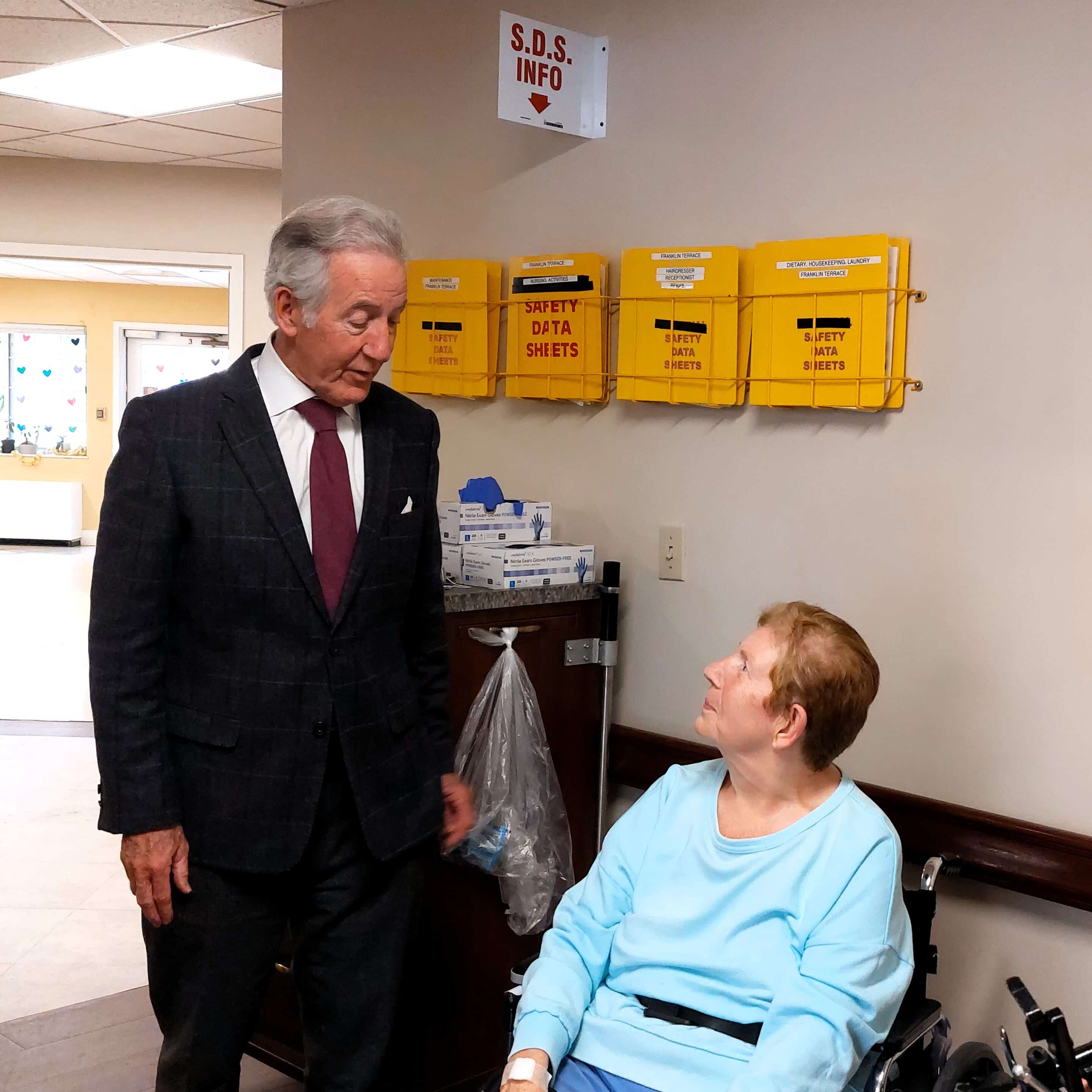U.S. Rep. Richard Neal greets Lauretta Ford, a resident at Life Care Center of Wilbraham, during a recent Western Mass. visit to talk Medicaid.
Reminder Publishing photo by Sarah Heinonen
SPRINGFIELD — U.S. Rep. Richard Neal believes that what is currently going on at the federal level will ultimately only benefit the rich.
In a sit down for a “Government Matters” segment with Focus Springfield on May 18, the Springfield Democrat called Trump’s new “Big Beautiful Bill” and the cuts made by the Department of Government Efficiency “unconscionable.”
“This is a big, beautiful tax cut for millionaires,” Neal said, during the interview. “They’re trying to camouflage and disguise … but there is no getting away from the basic fact this is a big tax cut for people at the top.”
Trump’s bill, which was narrowly passed in the House and now heads to the Senate, includes controversial cuts to SNAP food assistance by roughly $230 billion over 10 years and rules around Medicaid that could potentially take close to eight million Americans off the health insurance program.
A press release from Neal’s office sent to Reminder Publishing in April said that 48% of adults are at risk of losing their health coverage due to proposed Medicaid work requirements in Trump’s bill. Across the state, there are 1.6 million residents on Medicaid, including 330,000 in Neal’s Western Massachusetts district.
Neal said the Medicaid proposal is being undertaken for one purpose: “to cut spending for people at the lower end of the economic spectrum so you can finance a tax cut for people at the top.”
Neal said he believes the Trump bill will likely be “radically reshaped” by the time it goes to the Senate.
Federal cuts
During the interview, Neal also sounded off on Department of Government Efficiency cuts and the termination of Biden-era climate grants, including those that are impacting Western Mass.
Recently, Springfield lost $20 million in funding from the EPA’s Community Change Grants Program, which was borne out of former President Joe Biden’s Inflation Reduction Act. The grant, part of 800 that were eliminated across the country, was supposed to modernize critical infrastructure and improve public health, safety, transportation and environmental resilience in the city of Springfield.
Trump also took away $1 million from the EPA in asthma prevention support for Western Mass.
According to the state, that funding was intended to support in-home environmental remediations, such as mold removal and improved ventilation, in Chicopee, Holyoke and Springfield.
For public health leaders and local officials, the termination of this money is concerning for a city that was dubbed the “asthma capital of the country” in 2019, according to the Asthma and Allergy Foundation of America, and was named the fourth most challenging place to live with asthma as of 2024.
Additionally, a recent report by the American Lung Association gave Hampden County a “D” for poor air quality, with 5,576 children and 43,484 adults suffering from with disease.
During its regular meeting on May 12, the Springfield City Council unanimously approved a resolution that urges the EPA to restore the grant.
“I look at some of these proposals on the Inflation Reduction Act, which is singularly the most important piece of climate legislation in the history of the world; $412 billion worth of tax credits,” Neal said. “And the president is threatening to walk away from … a lot of it.
“I don’t understand for the life of me how some of these congressmen and congresswomen from red states and red congressional districts will let that happen,” he continued.
Meanwhile, the United States Department of Agriculture canceled some food deliveries to the Food Bank of Western Massachusetts through August, amounting to approximately $440,000 worth of food.
While this loss of federal food represents only 1% of the Food Bank’s total distribution last year, the nonprofit will now need to make up for this shortfall by drawing on its emergency reserves to purchase food, according to previous Reminder Publishing reporting.
Based in Chicopee, the Food Bank supplies food to 194 local pantries, meal sites and shelters across all four counties of Western Massachusetts. People get food from these local members, the Food Bank’s own Mobile Food Banks and its Brown Bag: Food for Elders programs.
Leaders of the food bank said the network is seeing unprecedented demand for food, with average of 132,000 people get food assistance monthly.
“There are a lot of people that never thought they’d be using a food distribution site like that,” Neal said in response to that cut. “I look at a country that’s been blessed with the bounty that we have. We should be able to make sure everybody has sufficient nutrition every single day.”


